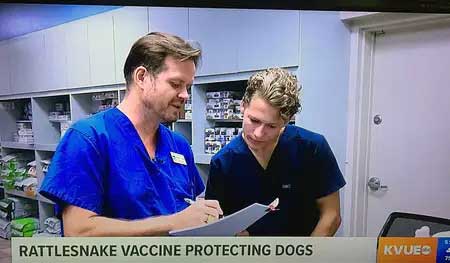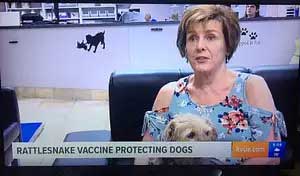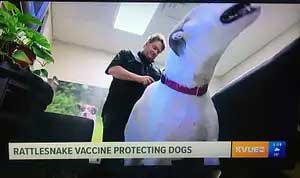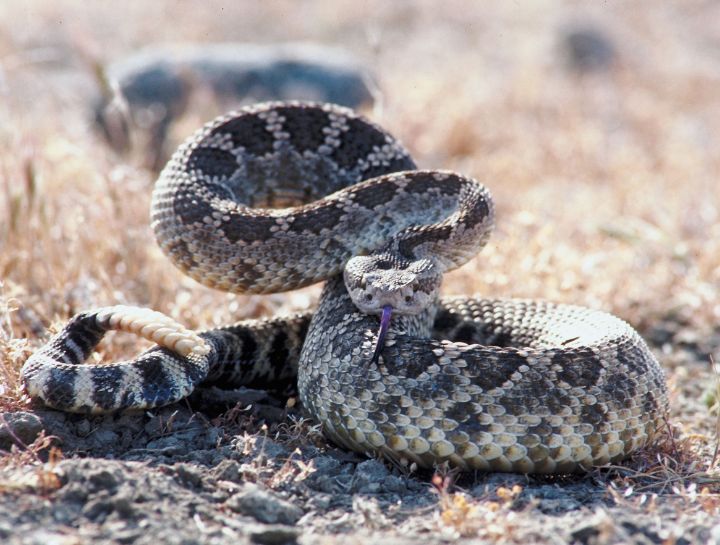Rattlesnake Vaccine & Treatment
Protect your pet from rattlesnake poison
Since we reside in the state of Texas, we see numerous curious dogs who are victims of snake bites each year. Snake bites are considered a veterinary emergency, and these bites can result in serious injury or even death.
 Your safety is important to us, so please pay attention to your surroundings as the snakes begin to make their appearance in springtime and continue to stay active in the summer months and into late fall.
Your safety is important to us, so please pay attention to your surroundings as the snakes begin to make their appearance in springtime and continue to stay active in the summer months and into late fall.
If you suspect that your dog has been snake bit, is essential to get your dog to a veterinary hospital as quickly as possible. You can even call us right away at (512) 288-1040!
Venom can cause organ damage and interfere with blood clotting. Swelling of the head can become so severe that it can block a dog’s airway. If a dog has been bitten on the body, the circulatory system can shut down, and organ failure can occur, all within 30 minutes.

Spotty, Day 2. Recovering from snake bite. Note two puncture wounds on the bridge of the nose.
Fortunately, the survival rate for snake bite victims has increased due to the following:
- Availability of rattlesnake vaccine
- Quick actions by informed pet owners
Rattlesnake Vaccine
We are pleased to offer the canine rattlesnake vaccine. The initial vaccination can be administered at 16 weeks of age. A booster is required 4-6 weeks after the initial vaccination. The vaccine works by stimulating your dog’s immunity to defend against this harmful toxin.
vaccine. The initial vaccination can be administered at 16 weeks of age. A booster is required 4-6 weeks after the initial vaccination. The vaccine works by stimulating your dog’s immunity to defend against this harmful toxin.
Even if your dog has been vaccinated with the rattlesnake vaccine, it should still be taken to a veterinarian for evaluation and care if a snake bite is suspected.  We can determine additional treatment if necessary. For example, fluids, and antibiotic treatment may be needed to help alleviate symptoms and discomfort.
We can determine additional treatment if necessary. For example, fluids, and antibiotic treatment may be needed to help alleviate symptoms and discomfort.
Dogs who have not received a rattlesnake vaccine have a more difficult time of recovery; however, bites are still treatable. If your dog has been bitten:
- Try to identify the snake by taking note of its size, color patterns, and the presence of a rattle
- Look your dog over carefully for fang marks, noting that there may be more than one bite wound
- Keep your dog as calm and quiet as possible
- Get to a veterinary hospital for further consultation (come see us!)
Learn more about venomous Texas snakes (Helpful information provided by the Texas Parks and Wildlife Department.)
Want to learn more? Check out the following article by Dr. Sarah Kneupper:
Brush Up On Your Snake Smarts
With the advent of warmer weather, snakebite frequency in domestic pets increases. Rattlesnake bites are the most severe, and unfortunately, one of the most common snakebites treated by veterinarians in the Hill Country. Since rattlesnake envenomation has great potential to be fatal, it is important to have as much information as possible.
Snakebite severity varies based on several factors. The amount of venom injected in one bite can be quite different based on the age of the snake and the time of year. Younger snakes and snakebites that occur earlier in the spring often mean more venom is injected into the victim.
If an animal is bitten more than once, the venom dose may be higher and the reaction more severe.
Bites to the trunk area can carry a poorer prognosis than bites to the face or feet, although facial bites can result in significant enough swelling to render the animal unable to breathe due to airway constriction.
Time elapsed from the bite to veterinary treatment is a critical factor for dogs and cats who have been snake bitten. The quicker veterinary care is received, the better the prognosis for survival.
If you know or suspect your pet has been snakebitten, please immobilize your animal to slow the spread of venom and seek veterinary care as soon as possible. If a rattlesnake bite is known, your veterinarian will begin treatment likely including IV fluids, antibiotics, and antivenin.
Please be prepared for a possible prolonged hospital stay for your pet that may extend to several days. Snakebite wounds can involve extensive sloughing of dead tissue from the site and may require several weeks of wound care by the owner after the pet goes home.
Help your pet avoid snakebites by staying away from piles of rocks or wood outside, or tall grassy areas. Ask your veterinarian about the rattlesnake vaccine, or call us at (512) 288-1040 for more information.

